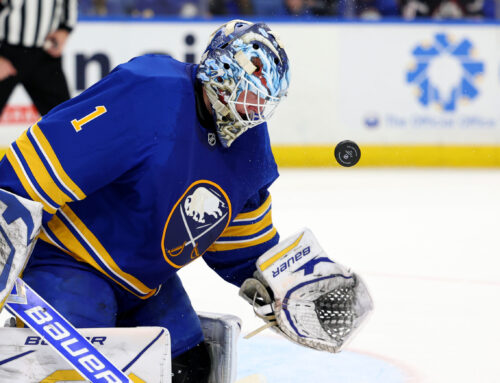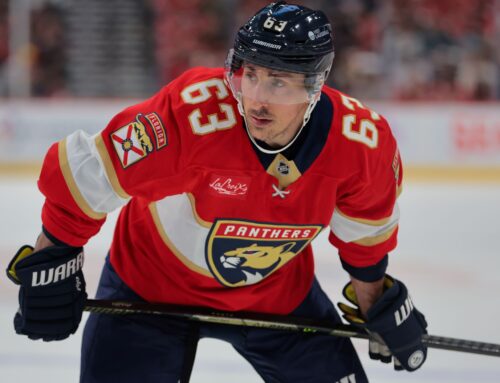Sunday, July 19
Ian Gooding
2015-07-19
Advanced stats, Duncan Keith, and Seattle and NHL expansion
We've officially reached the point in the summer where there's not a lot of hockey news. So I'll try not to ramble on, so to speak. There won't be as much fantasy news and advice in today's Ramblings – just a few topics covered more in-depth. Neil covered the analysis of the NHL.com fantasy rankings in yesterday's Ramblings with some great points to ponder. But do you know where you can get a lot more of that information? The Dobber Draft Guide, which is coming soon.
Speaking of which (teaser time), I'll be writing about 20 players to invest in for long-term payoff. These are players who probably won't be ready for fantasy stardom this season but are worth investing in for the future. Rookies won't be included in this article, as they will be in a separate piece from another writer. This is the kind of piece that will target those of you in deep keeper leagues – or maybe even those of you who simply want to get a leg up for 2016 drafts.
*
In Friday's Vancouver Province, long-time writer Tony Gallagher had a thought-provoking piece on stats. For those of you who are very pro-advanced stats, it may come off as yet another attack article. But Gallagher, who has an interesting way with words (even more so in radio interviews, in fact), describes the main reason for the introduction of new NHL stats over the past 40 years as being for contract negotiations. So you have agents and lawyers to thank for your stats beyond goals and assists.
So with that, I'll give you my philosophy on advanced stats. Maybe because Demetri is not submitting a Contrarian article this week, I'm going to go a little contrarian myself.
When I first started playing online fantasy hockey around 10 years ago (I participated in numerous hockey pools before that), the basic stats were all that were needed to get by. But when I began looking for that edge to determine whether a particular player appeared to be trending upward or downward, I discovered the wonders of stats such as time on ice, shooting percentage, and even points per 60 minutes. Some interesting stuff that I would attempt to use in my articles whenever it made sense to.
The last few years, the advanced stats revolution brought us new stats such as Corsi (shot attempts 5 on 5), Fenwick (unblocked shot attempts 5 on 5), and PDO (sum of a team's even strength shooting percentage and even strength save percentage). Nowadays, we have entire articles devoted to one player, which include scatter plots showing everything from impact on linemates to percentage of high danger scoring chances. Whoa. I bet your statistics professor would be proud.
There's a term in sales known as "data dump." To picture it, imagine yourself buying a computer. You want something that you can use for documents and spreadsheets, surfing the internet, and maybe playing some games. So you tell the salesperson what you need this computer to do and what your budget is. The salesperson tells you how many GB (now TB) of storage the computer has, how much RAM the computer has, and that there are full HD graphics. Great, you're sold.
But then the somewhat verbose (or maybe very expert) salesperson goes on to tell you about the processor cache, the system bus, the types of available PCI slots, and other finer points about the operating system that you wouldn’t normally pay attention to, and on and on… By then, you're thinking either a) the salesperson has completely lost you, even though you've said you're ready to buy, or b) you need to shop around because you only know a small fraction of what you need to know before you can possibly buy one.
That's a little bit of how I feel about this explosion of advanced stats. I find them very interesting, I will look at them from time to time, but sometimes I already know enough about a player to make an educated decision. It doesn't mean I always use gut feeling to analyze every player, as I simply don't watch enough hockey to turn style of play into raw numbers. But it's just some food for thought, particularly if you feel overwhelmed by the sheer amount of stats, or feel the need to assume everything that stats provide is the gospel truth.
This comes back to Gallagher's original point. Over time, we will have a better idea about which of these stats are more meaningful. And that will help us get past the information overload.
*
Here's something that stats don't account for: the improvement or decline of a player due to non-reported personal factors. Case in point is Duncan Keith, who put together a magical season capped off with a Conn Smythe Trophy in spite of being in the middle of a divorce complete with child involved (Sportsnet). Personal issues can cause someone to immerse themselves in their work so that they don't have to think about the problems, which seemed to be the case for Keith. But the opposite can be true for many other players. There are numerous personal issues that can absolutely sink a player's career.
Duncan Keith celebrates the Hawks' Stanley Cup victory on the ice with his son, Colton. pic.twitter.com/7e0m8bhHlD
— The Canadian Game (@ItsCanadasGame) // You can place JavaScript like this
There have been many cases through the years of players whose production suddenly fell off a cliff for no explained reason. The player wasn't injured, didn't have different linemates, and wasn't a victim of reduced icetime. But something seemed off, and it showed in the player's stats. Maybe it was confidence-related, but maybe something else was happening. Mainstream media usually won't report what's going on in a player's personal life, nor should they be (unless in Keith's case, they volunteer that information).
But if we didn't know about Keith's personal situation, and he experienced a decline last season, would we really know why? Stats and numbers wouldn't tell the whole story. By the way, Keith's regular-season production dropped 16 points from 2013-14 to this past season.
*
A topic that doesn't relate much to the fantasy game but will receive tons of discussion in the near future anyway is expansion. It sounds like Las Vegas and Quebec City will be making their bids for expansion teams. However, Victor Coleman, who was of Seattle's prospective bidders, has bowed out. There is still a chance, however, that Ray Bartoszek may make a bid for Seattle by the Monday deadline (KING 5).
Living in Vancouver, I can tell you that Seattle is a great place to watch a Mariners game. From what I've heard, it's an even better place to watch a Seahawks game. But in spite of the greater Seattle area hosting both the Seattle Thunderbirds and the Everett Silvertips of the WHL, I've never really gotten the vibe that Seattle is a hockey town. Last year, I participated in a roundtable article over at The Hockey Writers on whether Seattle would make for a solid NHL market.
Having said that, I would love to see a team in Seattle with folks there embracing it. If you've ever looked at one of those maps of North America with NHL logos on it, you'd notice that Vancouver seems further away from the rest of the league than any other NHL team. With Seattle only 2-3 hours down the I-5 (depending on border traffic), the Canucks would have a natural rival and perhaps even some competition for what are often close to the highest ticket prices in the NHL.
But I think what sports fans in Seattle are really pining for is their NBA team. I'm not a huge basketball fan, but I truly believe that Seattle was robbed of the Sonics – even more so than Vancouver was of the Grizzlies. I know this is not a basketball site, but this documentary on the way the Sonics left Seattle is worth watching if you happen to have a couple hours to spare.
Mind you, I've been to Las Vegas more than once and it strikes me even less as being a hockey town. I can say, however, that I watched a hockey game there once – a Sharks/Ducks rookie game at the Orleans Hotel, a game which featured Logan Couture. It wasn't a huge arena and there weren't seats on all sides, and you had to walk a mile through the hotel casino just to get to this rink. But in Las Vegas, money talks, and Gary Bettman seems committed to making it work there.
Enjoy your Sunday, and thanks for reading.





 FLA
FLA EDM
EDM OTT
OTT NYR
NYR CHI
CHI BUF
BUF WSH
WSH CAR
CAR
